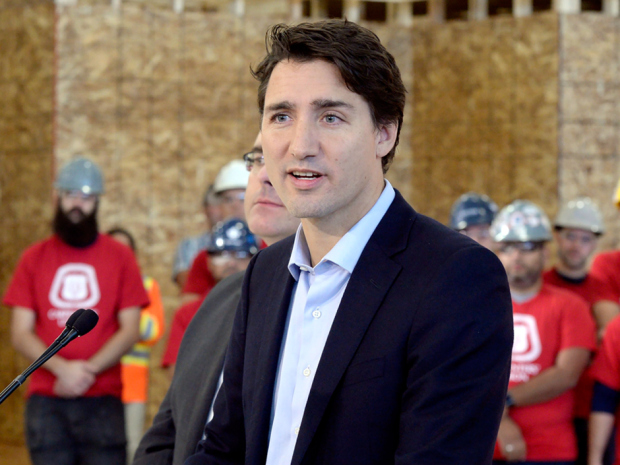With Justin Trudeau and Stephen Harper neck and neck entering the home stretch, one question now imposes itself: What kind of government are we likely to get if Trudeau becomes prime minister, assuming the Grits were to wind up in a position to implement most or all of their pledges? We now have, quite handily, the full document in one discreet booklet. It’s a mixed bag.
Trudeau entered the Liberal leadership race three years ago promising to reinvent Liberalism top to bottom. And indeed, he and his team have thoroughly overhauled the party’s structure, particularly its fundraising. Liberal policy generation, as I argued last time, is now far more oriented toward the so-called middle class (meaning swing voters) than ever before.
That said, there’s also much in the Liberal policy summary that smacks of failed Red Books past — as though the party is still struggling to reconcile its need to win elections with certain old reflexive twitches.
On the plus side, leading the way, would be that income taxes for most Canadians would come down under a Liberal government. The Liberals say cutting the marginal tax rate on income between $44,700 and $89,401 to 20.5 per cent from the current 22 per cent, combined with more generous child benefits geared to income, would benefit 90 per cent of families.
The Liberals’ accountability and democratic reform plans, if implemented, could be transformative; they amount to a wholesale repudiation of 30 years’ accumulation of power in the Prime Minister’s Office.
The plans include banning partisan advertising by the government; making the electoral system more proportional; making Senate appointments arms-length and merit-based; upgrading the debacle of Question Period with, among other things, a Prime Minister’s Question Time as the British House of Commons enjoys; ending the use of omnibus bills; ending prorogation as a tactic for avoiding the judgment of the House; beefing up the role of parliamentary committees; and giving Officers of Parliament more teeth.
The Liberal platform contains a raft of measures to improve services and benefits for Canadian military veterans, which go well beyond reopening the nine dedicated Veterans Affairs offices that were shuttered by the Conservatives in cost-saving exercise that, in retrospect, looks ever-more misguided, self-defeating and stingy. Of all branches of the Canadian public service, military serving overseas in war zones are the only ones for whom the risk of being blown up is a routine part of the job. It is only right that this extraordinary commitment be recognized, and it’s to the Liberals’ credit they aim to do so, if elected.
Beyond that, however, some red flags emerge.
Over the next decade, the platform enthuses, a Liberal government will boost funding in “social infrastructure” by a cool $20 billion. This grab bag includes affordable housing, transit, seniors’ centres, early childhood education, parks, playgrounds — indeed, anything the government deems a nice idea, it seems. Elsewhere in the document, under a heading entitled “making decisions,” the Liberals promise to “invest only in programs proven to offer good value.” Given Trudeau’s political partnership with Ontario Premier Kathleen Wynne, one can’t help but wonder: Good value, like the billions wasted via Ontario’s Green Energy Act?
The platform promises to “take action on climate change, put a price on carbon, and reduce carbon pollution.” Never mind that carbon is not, in fact, pollution, but the chemical building block of all life on Earth. There’s no suggestion of how any of this is to work. “We will instead partner with provincial and territorial leaders….” This bit reads like nothing so much as an attempt to be seen to be proactive, while avoiding the political penalty of proposing a carbon tax.
Following the repeated drubbings the Liberals have taken over their gun-control boondoggles over the years, one would have thought they’d steer well clear, but no: Old habits die hard. Though the Grits promise not to resurrect the long-gun registry, they do intend to repeal sensible measures that reduced red tape for law-abiding gun owners transporting firearms back and forth to a firing range. To repeat: Illegal guns, mainly illegal handguns smuggled in from south of the border, are the cause of most urban gun violence. Saddling legitimate gun owners with additional paperwork makes no one any safer. Nice optics, though.
Most disappointing of all, in a substantial section on rethinking the country’s relationship with First Nations, is a commitment to ensure that “the Kelowna Accord — and the spirit of reconciliation that drove it – is embraced.” So, a 10-year-old deal? Really? Nowhere is there a mention of reforming or abolishing the 1876 Indian Act, which is explicitly racist, a national disgrace, and still the law of Canada.
The money the platform dedicates to aboriginal issues — $2.6 billion over four years — is barely more than the Conservatives offered up in their ill-fated First Nations Education Act. The sweeping reform necessary to end the chronic inequality between aboriginal and non-aboriginal Canadians, apparently, would have to wait for another day, yet again.




